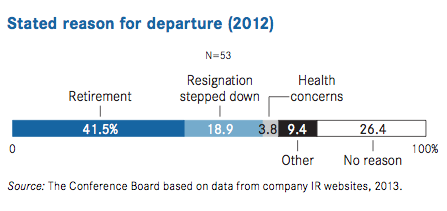The Conference Board’s take on external communications around CEO succession planning
When it comes to the CEO succession planning process, companies need to have an external communication plan. This is particularly critical in view of the greater scrutiny that shareholders are paying to how well-prepared companies are for leadership transition events, according to the chart of the week that the Conference Board highlighted from its new report, CEO succession practices: 2013 edition.
In 2012 nearly 44 percent of S&P 500 companies gave stakeholders advance notice of a CEO succession through a press release. For those companies, the median lead time to the effective date of a new CEO’s appointment was three months, although it ranged from one to 10 months, the chart shows. The appointment announced was effective immediately for the remaining 56-plus percent of companies.
Almost three-quarters of the companies that announced new CEOs in 2012 provided a reason for current CEO’s departure: 41.5 percent mentioned retirement, 18.9 percent said resignation, 3.8 percent cited health concerns and 9.4 percent specified other issues.

Reasons why CEOs leave – from the Conference Board's chart of the week
The details of succession announcements in 2012 were fairly typical, the Conference Board says. In addition to providing a reason for the change in leadership and when it would occur, they included:
- whether the incoming CEO would be named board chairman;
- a statement by the departing CEO stating confidence that the board had chosen a qualified replacement;
- a statement by the lead independent director that the incoming CEO is the right choice for the company, given its current position, and thanking the departing CEO for his or her service;
- a statement from the incoming CEO that the existing management team is strong, the company is well positioned for the future, and expressing appreciation for the board’ appointment;
- a description of the incoming CEO’s professional qualifications, and, if necessary, details on other director or senior management changes that will take place.
For other trends in CEO succession, see CEO succession favoring outsiders, says Conference Board.










